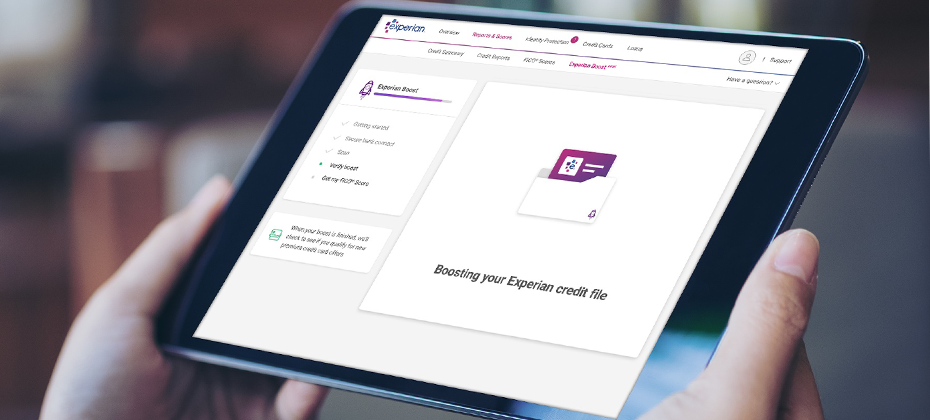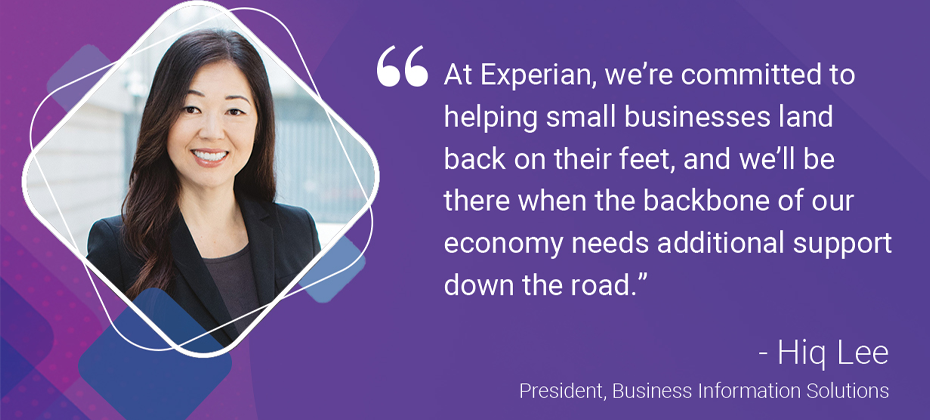NA – North America
News about Experian North America:

In May 2020, Experian launched Sure Profile and became the first company with an offering to fight synthetic identity fraud that’s integrated into the credit profile with market-leading assurance. In fact, we are so confident in our solution that we’ll share in loan losses on assured profiles if we get it wrong, a first for the industry. Recently, International Data Corporation (IDC) highlighted Sure Profile in the report, IDC, Synthetic Identity Fraud Update: Effects of COVID-19 and a Potential Cure from Experian (doc #US46690220, July 2020) stating “IDC Financial Insights believes that Experian's Sure Profile has the potential to have market disrupting effects in the battle against SIF (synthetic identity fraud).” According to McKinsey, synthetic identity fraud is the fastest growing financial crime in the United States, accounting for 10% to 15% of lender losses each year. Synthetic identity fraud occurs when fraudsters combine real and fake information to create “Frankenstein IDs” which are then used to obtain credit or to add these identities as authorized users to existing credit accounts. Then, financial institutions report the identities to credit reporting agencies. A new record with the false information is created and subsequently, the synthetic identity can be used to generate other fake accounts. It is a significant problem that Juniper Research expects will lead to $48 billion in annual online payment fraud losses by 2023. IDC recommends that financial institutions consider Sure Profile when researching how to fight synthetic identity fraud. For institutions that use an analytical platform to detect synthetic identities, IDC suggests examining Sure Profile to see how it can supplement their models, or even replace them. "Synthetic identity fraud is a massive problem for banks, and I believe that the effects of COVID-19 will exacerbate the problem. However, at the same time, Experian launched a new offering that I believe will be a game changer for how banks attack the synthetic identity problem." — Steven D'Alfonso, research director, IDC Financial Insights Sure Profile validates identities, detects profiles that have an increased risk for synthetic identity fraud and helps cover resulting losses for assured profiles. Leveraging the capabilities of the Experian Ascend Identity Platform™, it uses data to drive advanced analytics, including newly developed machine learning models that predict the likelihood of synthetic identity behavior. Sure Profile provides lenders a simple approach to define and detect synthetic identities early in the originations process. To learn more, check out Experian's Sure Profile.

As financial uncertainty persists, you may find yourself turning to your credit cards to get through this challenging time. While credit cards can be a valuable financial tool when used wisely, they can also be a source of financial stress if you find yourself charging more than you’re able to pay back. Not managing your debt well can also affect your credit utilization, a term you’ve probably heard of but may not know much about. Simply put, credit utilization measures the amount of available credit you’re using on your credit cards. It’s a ratio of your outstanding balance to your overall credit limit. So, what does it mean for your credit score? Let’s unpack some myths and facts that may help you understand the importance of credit utilization, as well as ways to calculate and manage your utilization. Myths vs. Facts Myth: Credit utilization has no impact on your credit score if you pay your bills on time. Fact: In FICO’s most commonly used credit-scoring model, debt and credit utilization account for 30% of your overall score, second only to your payment history. This means the closer you are to your credit card limit, the lower your credit score might be. Aim to keep your utilization per credit card as low as possible to safeguard your score. As your utilization ratio approaches 30 percent of your limits, your scores will begin to decrease much more rapidly. People with the best scores generally have utilization of less than 10 percent, and you never want it to exceed 30%. Myth: If you max out a credit card, you should take out a new card to free up your overall credit limit and improve your utilization ratio. Fact: There are two types of credit utilization measurement: per-card and overall. Per-card utilization looks at your ratio of debt to credit limit on an individual card basis. Overall utilization takes your total utilization across all cards into account. Credit scoring models take both per-card and overall utilization into account, so having just one maxed out card could hurt your credit score. Opening a new account also introduces several aspects that may actually increase your risk. There is a new inquiry. A brand new account has been added to your credit report that you haven’t started to pay on, yet. And because scores require three to six months of activity before being included in score calculations, it’s not helping your scores. In fact, the risk associated with opening a new account may outweigh any potential benefit of reducing your utilization rate. Myth: Once you pay off a credit card, your credit score will improve. Fact: While your credit score could see improvements if you pay off a credit card, the impact may not be immediate. Your lender reports your account status about once a month, so it could be several weeks before your report is updated. Scores calculated after your report is updated will reflect the paid off amount. Depending on when you made a payment, it could take a full billing cycle before your credit report is updated and your credit score reflects those changes. Now that we’ve established the basics of credit utilization and how it can impact your score, consider how to keep it in check. Calculate your utilization The first step to getting your utilization rate in a good place is to determine your current utilization percentage. You can calculate your utilization rate by: Adding up the total balances on all credit cards Adding up the total credit limit across credit cards Dividing the total balance (from step 1) by the total credit limit (from step 2) Multiplying this number by 100 to see your credit utilization ratio as an easy-to-read percentage Manage your utilization Thirty percent utilization is not a goal or target. This is a common misconception about credit utilization. Thirty percent is a number you should strive to stay as far below as possible. It represents a mathematical limit at which your scores will begin to plummet. The lower your utilization rate, the better. Paying your balance in full is ideal, but that’s not always practical. As a general rule of thumb, aim to keep your utilization as low as possible to minimize its impact on your credit score. If you’re wondering how to lower your credit utilization ratio, consider the following strategies: Make multiple payments throughout the month. Instead of allowing the balance to accumulate, pay down your debt in increments throughout the month to ensure the amount on your billing statement doesn’t close in on your limit. Time your payments, and make sure you pay in full each month. Time your payments ahead of your statement closing date, so your most up-to-date credit utilization information is calculated into your score. It’s ideal to pay the balance due in full. If you can’t pay it in full, pay as much as you can to keep your utilization as low as possible. Keeping open credit accounts. Even if you don’t intend to use them much, closing accounts with zero balances can lower your overall credit utilization. You need to make a small purchase from time to time to show activity in the account, though. Accounts with no activity reported will be excluded from scores after a period of time. If you don’t use the card, it could still be on your credit report but not be helping your credit scores. If you’re concerned about making payments on time, connect with your lender to determine the best path forward. Check out my recent post on deferment and forbearance relief options for more information.

Experian is a proud member of the Better Identity Coalition, which is committed to working alongside policymakers to improve digital security, identity verification, privacy and convenience for everyone. Together, we’re seeking innovative ways to empower Americans to take control of their identities and conduct online business securely. On September 11, 2020, a bipartisan group of House members led by Congressman Bill Foster, introduced the “Improving Digital Identity Act of 2020” to modernize and digitize our essential government identity infrastructure. Through the Better Identity Coalition, Experian supports this bill and the steps it’s taking to help improve digital identity, security and privacy for Americans. As a result of the impact of the COVID-19 pandemic, consumers and businesses have quickly adapted to doing nearly everything digitally, but most government-issued identity credentials, such as drivers’ licenses and passports, were not created to be verified online. The “Improving Digital Identity Act” creates a comprehensive approach across federal, state and local government to address critical shortcomings in identity tools that today make it easy for fraudsters to prey on Americans. The bill creates a framework of standards that new identity solutions should follow to ensure privacy. The bill also allows for federal grants to be given to states to jumpstart modernization of the systems that provide driver’s licenses or other types of credentials to enable digital identity verification, in accordance with the NIST framework. It’s important that the bill gets passed to bring the United States up to speed on digital identity and help fix government-issued identity problems. In addition to supporting bills like the “Improving Digital Identity Act of 2020,” Experian is working hard to develop new innovations to make digital commerce safer for consumers and businesses. Our most recent innovation, Sure Profile makes us the first company with an offering to fight synthetic identity fraud that’s integrated into the credit profile with market-leading assurance. In fact, we are so confident in our solution that we’ll share in loan losses on assured profiles if we get it wrong. Experian is also proud to be the only credit bureau in the initial rollout of the Social Security Administration’s new electronic Consent Based Social Security Verification service. Our inclusion ensures our clients have the tools to more easily detect online fraud while also better recognizing legitimate consumers.

The COVID-19 pandemic reshaped Americans’ personal and financial lives. If you find yourself in a situation that could make fulfilling your credit card, loan, or mortgage payments challenging, you may be wondering what relief options are available to help navigate these changes. The good news is there are options if you need financial support during this time. However, it can be difficult to know where to start. The two primary relief avenues are deferment and forbearance. While different in practice, these terms are often used synonymously, even by those within the credit industry. While similar at first glance, there are significant differences between forbearance and deferment agreements. While both are intended to pause or reduce payments for a certain period, there are variances when it comes to how you must repay the delayed payments. It’s important to understand how these two options work when speaking with your lender, so you can choose the best path for your personal financial situation. Whichever avenue you take, remember that deferment and forbearance are both temporary measures and shouldn’t be used as permanent solutions. Pausing Payments with Deferments You may have seen the term deferment in the news more recently with mortgage relief and student loan deferral options. So, what exactly is deferment? Through this option payments are put on pause and deferred until a later date. This is a longer-term strategy that enables you to pay back your loan over time, when your financial situation puts you in a position to do so responsibly. Interest can sometimes accrue during a deferment period, depending on the type of loan and the lender you’re working with, so it is important to talk with your lender to fully understand your agreement terms. Periods of deferment vary in length – in some cases lasting as long as your financial situation requires. You should opt for deferment if your financial situation or an unexpected event, such as being let go from your job, creates an undue burden that makes it impractical or impossible to keep up with regular payments. Temporary Relief with Forbearance The other option to discuss with your lender is forbearance. Whereas deferment allows you to pay back a loan over time, forbearance is a relief strategy that typically requires the borrower to pay a lump sum and accrued interest at the end of the forbearance period. For example, if you paused payments for five months, at the end of those five months, you would pay your lender the total of paused payments and the accrued interest. If you’re seeking forbearance for federal student loans, there are two different types of forbearance: mandatory and discretionary. With mandatory forbearance, lenders are required to pause payments if a borrower meets a set of financial criteria that could prevent them from making payments on time. Eligibility for mandatory forbearance includes: enrolment in a medical or dental residency program, payments on your federal student loans being greater than 20% of your total monthly gross income, and other circumstances that could hinder your ability to make payments. Confirm whether you’re eligible with your lender. Discretionary forbearance means the lender makes the decision at their discretion to put payments in forbearance based on your unique financial situation. Forbearance is generally a shorter-term option and the avenue to take if you don’t qualify for deferment. Consider forbearance in times of true financial crises, such as an unexpected medical bill, that would temporarily inhibit you from making a monthly payment. How to Work with Your Lender on Relief Options While discussing these options with your lender, it is critical to have a full understanding of what the agreement will entail – from interest rates to your timeline for payment – to ensure you’re in the best position to fulfill the agreement with your lenders once your payments resume.

While consumers throughout the U.S. continue to manage the impacts of COVID-19, aside from health and wellbeing, one of the most salient concerns has been around the health of consumers’ finances. With many falling under some form of stay-at-home order since the onset of the pandemic, local economies have been jolted and some consumers may be feeling the financial impacts. As part of Experian’s commitment to improve the financial health of Americans and educate on debt and credit, we focused our research efforts to analyze internal and external data to show how consumer finances have changed in recent months. Through our initial review, we found that certain measures of consumer finances, on average, had improved since the onset of the pandemic. Whether due to the unprecedented government stimulus, or changes in spending, consumers saw a reduction in average debt and increased average credit scores. Though the data is rapidly changing and the true financial implications of the pandemic may be partially obscured by governmental stimulus efforts, we wanted to take a snapshot and highlight how consumers are faring in the moment. By providing these insights, we can use data for good, helping organizations, experts, and others apply learnings that may positively guide efforts in the future for the benefit of all. Our Main Findings from January 2020 to May 2020: The average VantageScore has increased by 5 points Total average consumer debt total declined by 1% Average consumer credit card balances have decreased by 14% The average credit utilization ratio has dropped 5 percentage points These findings offer an important snapshot of consumers five-months into the COVID-19 pandemic stay-at-home orders. Though initially positive, we want to keep an eye on these trends as they could change over time as government policies and stimulus efforts are amended to adjust to future conditions. To continue providing relevant insights on prevailing trends in consumer finances, we will work to maintain updated research content as the data become available. You can find links to our most recent research below, and check back at Experian.com/research for updated articles over the coming weeks. Our Most Recent Research Articles: COVID-19 Impact: Changes to Consumer Debt and Credit COVID-19: Consumers Reduce Overall Debt During Pandemic COVID-19: Credit Utilization Drops as Consumers Cut Spending

Many of us have turned to streaming services to help us cope during this time of COVID-19. Being able to escape with some good entertainment while still maintaining our social distance is invaluable right now. Television streaming has skyrocketed 85% since March; I’ve certainly contributed to that increase. Now, subscribing to that streaming service can do more than entertain, it can improve a consumer’s financial health. Starting today, Netflix® customers can possibly improve their FICO® Score by adding their positive payment history through Experian Boost. Experian Boost™† is the innovation we launched in 2019 that can help consumers improve their credit score instantly. So far, approximately four million consumers have connected their utility and telecom bills to Experian Boost, leading to more than 29 million points added to FICO® Scores nationwide. This addition makes sense. Experian Boost already allows consumers to receive credit for paying their cable bills, so paying for a video streaming service on time should also help prove creditworthiness. It’s critical that we meet consumers where they are and adapt to help them in their current position, especially during a pandemic. Anticipating and prioritizing consumer needs is our focus and drives our innovation. After all, we’re consumers too. I’m proud of how our team uses their personal experience and their roles at Experian to create opportunity for millions of people to improve their financial health, especially during these uncertain times. Our job is to help consumers, and that doesn’t stop with their credit score. That’s why we’re also launching new free features available to everyone within the CreditWorks Basic and Premium products. The free tools provide personal insights and resources that can help consumers better save money and manage their financial profile. For more information about Experian Boost go to: www.experian.com/Boost. Experian and the Experian trademarks used herein are trademarks or registered trademarks of Experian and its affiliates. The use of any other trade name, copyright, or trademark is for identification and reference purposes only and does not imply any association with the copyright or trademark holder of their product or brand. Other product and company names mentioned herein are the property of their respective owners. †Results may vary. Some may not see improved scores or approval odds. Not all lenders use Experian credit files, and not all lenders use scores impacted by Experian Boost. Credit score calculated based on FICO® Score 8 model. Your lender or insurer may use a different FICO® Score than FICO® Score 8, or another type of credit score altogether. Learn more.

“What does a credit bureau do?” is one of the most common questions I’ve answered throughout the years – both at conferences and cookouts. Admittedly, it can be difficult understanding the different roles of credit bureaus, credit score companies, and lenders. Amid COVID-19, it’s important for us to define our purpose and help guide you toward the right resources for financial help. As the consumers’ bureau, Experian is committed to examining financial questions and helping consumers, businesses, and lenders navigate this transitional fiscal landscape. It’s important for you to know your financial options and how to separate fact from fiction, especially during times of crisis. Here are answers to some of the most common questions about credit. Do credit bureaus make lending decisions? This is one of the rare instances in credit reporting for which there is a simple answer. No, credit bureaus do not make lending decisions. Lenders – such as banks, mortgage companies, credit unions, and credit card issuers – help consumers borrow money and they make the lending decisions. The credit bureaus are responsible for working closely with lenders to provide information that helps them make informed and responsible lending decisions. At Experian, we equip lenders with accurate and complete data about consumers’ and small businesses’ credit activity and payment history, which enables lenders to develop a full picture of a borrower’s financial health. During COVID-19, it is important for there to be open lines of communication between consumers and lenders about upcoming payments and payment plans. Some lenders are offering deferments and other workable accommodations to ensure consumers do not fall behind on their payments. It is important for consumers to contact their lenders to understand what options are available to them. Do credit bureaus control my credit score (and whether it goes up or down)? Credit bureaus, like Experian, do not determine your credit score. Credit scores are calculated based on third-party credit-scoring models, like those developed by FICO or VantageScore Solutions. These models use information from your credit reports, including credit activity sourced from credit bureaus, to calculate a credit score. The scoring models are proprietary to the companies that develop them. In the most fundamental terms, the credit bureaus are responsible for compiling the credit reports. The scoring companies create algorithms that calculate the score. Credit scores reflect the information in your credit report at the moment the credit score is calculated. The scores will change to reflect changes in your credit report. You control how you use credit, so you play an important role in determining whether your scores trend upward or slip downward. If you consistently make good credit decisions, your scores will trend upward over time. Reviewing your credit report helps you manage your credit and gives you a full picture of what lenders see. Monitoring your credit report is as important as reviewing bills and bank statements, as your credit is an integral part of your overall financial health. Additionally, with an increase in phishing and cyberscams as a result of COVID-19, it’s especially important to stay informed about your credit report, so that you can dispute anything you believe may be inaccurate and ensure that there is no evidence of fraud that could impact your score. Are lending decisions based solely on my credit score? No, credit scores are just one factor in lenders’ decision-making process. Lenders consider additional information when making a decision, such as employment status, income and information about a consumer’s assets and liabilities. In the wake of COVID-19, lenders may start to tighten their credit standards – meaning consumers may need a higher score to receive a loan. Because of this, it is important to be proactive and take action to mitigate any potential negative impact on your credit score. If you’re worried you may miss a payment, contact your lender to discuss your options. Through April 2021, Experian has partnered with our peer credit bureaus to offer a weekly free credit score at https://www.annualcreditreport.com/. This additional measure will allow consumers to access their credit reports frequently and talk to their lenders with the most updated information possible. How are credit bureaus working with the government during COVID-19? At Experian, we fully supported the signing of the Coronavirus Aid, Relief, and Economic Security Act (CARES Act), which provides relief to Americans through expanded unemployment coverage and by providing grants and loans to small businesses. The CARES Act also provided important guidance to lenders about how to work with consumers affected by COVID-19. Experian is working with lenders to ensure appropriate accommodations are made to protect consumers. Additionally, the credit reporting industry has developed reporting standards for lenders to use during emergency periods, such as COVID-19. These reporting standards allow lenders flexibility when reporting accommodations made to consumers who are experiencing hardships due to the pandemic. For additional questions regarding COVID-19 debt and credit relief options, view Experian’s full list of financial and non-financial institutions’ websites where you can find information on relief measures: COVID-19 (Coronavirus) Credit Card and Debt Relief.

Small businesses are the backbone of our nation’s economy, generating 44% of the nation’s overall revenue. When they take a hit, we all feel it. But as good neighbors – and frequent patrons – we can find a path toward keeping these small businesses on their feet and reopening their doors as soon as possible. At Experian, our obligation is to fight for small businesses that have been impacted by COVID-19. Main Street America reported in April that “COVID-19 has had a devastating impact on small businesses’ revenue…Approximately 35.7 million Americans employed by small businesses are at risk of unemployment as result of the COVID-19 crisis.” That is why we moved quickly to support the signing of the Coronavirus Aid, Relief, and Economic Security Act (CARES Act), providing relief to Americans through expanded unemployment coverage and by distributing grants and loans to small businesses. Acknowledging the unprecedented financial difficulties many are facing, lenders have established relief options for customers unable to make scheduled payments. In an effort to safeguard consumers against potential delinquency and protect credit, the CARES Act calls for creditors to adjust reporting systems for those taking advantage of these relief options. Simply put, your small business’s credit score shouldn’t be your biggest concern these days, and the CARES Act works to ensure that. We know there’s more work to be done to help small businesses navigate these challenging times. We’ve outlined the following steps to keep your business’s credit on track during the pandemic, taking advantage of resources and services we recently launched: Call Your Lender: If a customer or small business is unable to pay a bill, the most critical action they can take is to call their lender and inquire about available assistance programs. If consumers are able to get an accommodation, they can stop a missed payment from negatively impacting their credit. Business Resources Website: Experian has launched a website to help businesses prepare to manage increased attacks, push toward digital banking and understand regulatory changes as businesses find their footing in this evolving financial services landscape. Credit Report Access for All: Experian is offering all consumers access to a free credit report, FICO score and credit monitoring through our CreditWorks product, which also provides access to Experian Boost, a financial tool that has helped more than 2 million consumers increase their credit score to date. This is in addition to the free weekly credit score we are offering in coordination with our peers through annualcrediteport.com. COVID-19 U.S. Business Risk Index: Experian has launched a new service to help lenders and government organizations understand how to make lending options available to the business segments that need it most. This, in turn, directly helps small businesses gain access to capital they need. The public tool includes a risk simulator broken down by state to keep business owners updated on how COVID-19 is affecting specific industries in a particular region. As a nation, we have learned many lessons from the 2008 financial crisis. One vital lesson that sticks with us at Experian is that we’re better at tackling challenges as a collective financial industry, with transparency and a lending hand. At Experian, we’re committed to helping small businesses land back on their feet, and we’ll be there when the backbone of our economy needs additional support down the road.
To combat a growing threat that’s expected to drive $48 billion in annual online payment fraud losses by 20231, Experian® has announced the launch of Sure Profile™. Experian is the first company with an offering to combat synthetic identity fraud that is integrated into the credit profile with market-leading assurance. We are proud to be the first in our industry to actually put “skin-in-the-game” by sharing in fraud losses with our clients if the losses occur on assured profiles. Experian’s new offering validates consumer identities, detects profiles that have an increased risk for synthetic identity fraud and helps cover losses resulting from synthetic identity fraud for assured profiles. Leveraging the capabilities of the Experian Ascend Identity Platform™, Sure Profile utilizes Experian’s industry-leading data assets and data quality to drive advanced analytics that set a higher level of protection for lenders. Powered by newly developed machine learning and AI models, Sure Profile offers lenders a streamlined approach to define and detect synthetic identities early in the originations process. Experian’s Sure Profile differentiates between real people and potentially risky applicants, so lenders can confidently increase application approvals with less risk. We expect to authenticate most credit applications through Sure Profile. In the cases where the identity can’t be assured, the company will deliver additional fraud risk indicators, so that lenders can take the right next steps to verify the potential borrower’s identity and prevent fraud. To date, detecting synthetic identities has been a significant challenge for lenders because there’s not an industry standard or a single definition that can be used to establish the legitimacy of an identity. In addition, understanding the financial impact of synthetics has been difficult for lenders as losses tied to synthetic identity fraud are typically categorized as defaults or “bad debt.” With Sure Profile, we are reinforcing our position as a leader by creating a standard set of criteria to define a synthetic identity. Experian has always been a leader in combatting fraud, and with Sure Profile, we’re proud to deliver an industry-first fraud offering integrated into the credit profile that mitigates lender losses while protecting millions of consumers’ identities. Our investments in innovation, AI and machine learning and our data quality are enabling us to lead the way in identity protection and help protect consumers and lenders alike.